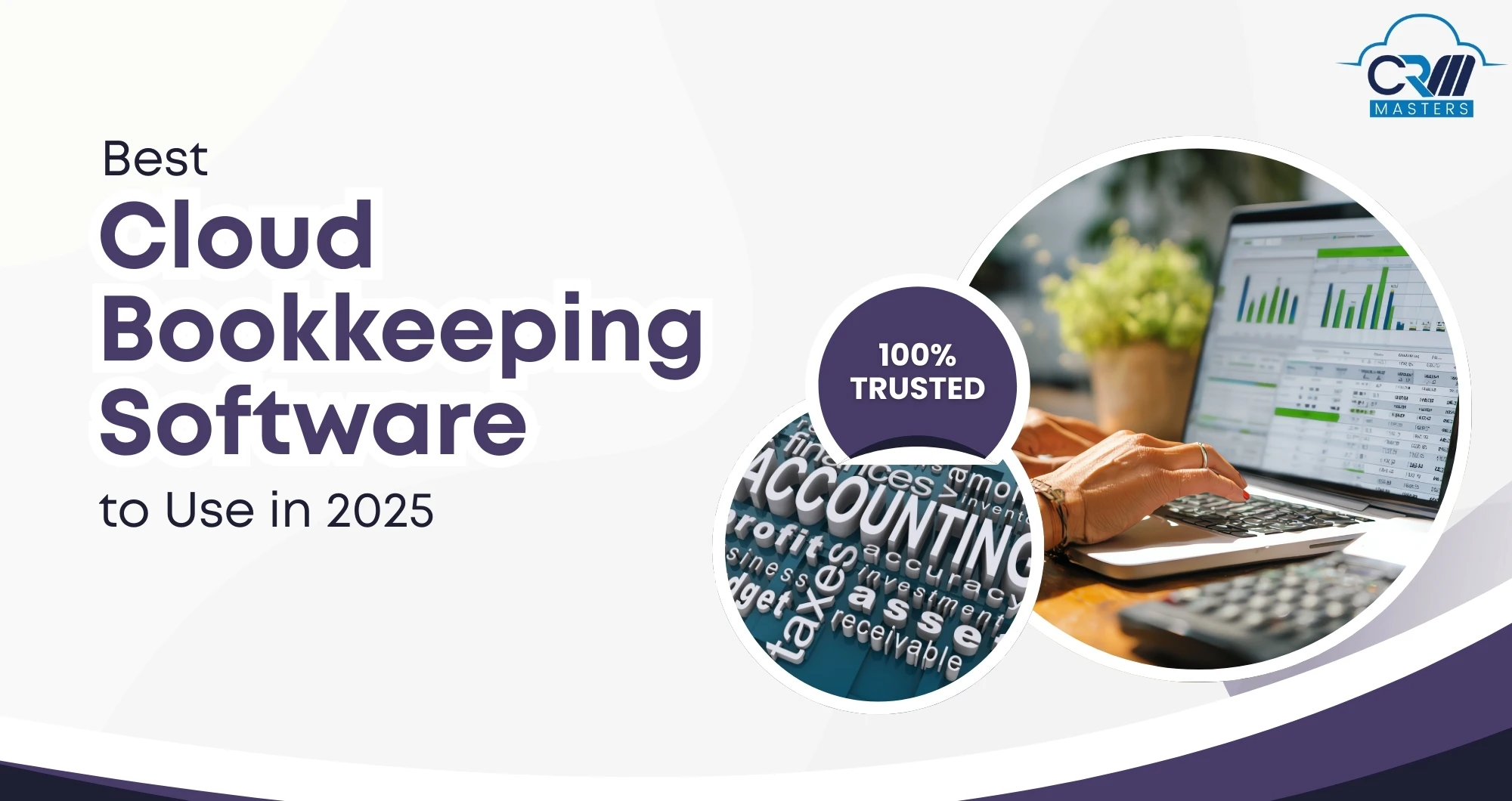
Best Cloud Bookkeeping Software to Use in 2025
Managing business finances is one of the most critical yet time-consuming tasks for any organization. From tracking income and expenses to ensuring tax compliance, business owners often find themselves overwhelmed with paperwork and manual entries. Thankfully, times have changed. Cloud Bookkeeping Software has made it easier than ever to manage finances, reduce errors, and access data anytime, anywhere.
In 2025, businesses aren’t asking if they should move to the cloud, it’s all about choosing the best cloud bookkeeping software for their needs.
What is Cloud Bookkeeping Software & Why Is It Essential?

Cloud Bookkeeping Software is a digital tool that helps businesses record, organize, and manage their financial transactions online. Unlike traditional desktop-based accounting software, cloud bookkeeping tools store all your data securely on the internet. This means you don’t have to install heavy programs or worry about losing data on a single computer, everything is stored safely in the cloud and can be accessed anytime, anywhere.
In short, it’s like having your entire accounting system available at your fingertips, on your laptop, phone, or tablet.
With cloud bookkeeping software, businesses can:
- Create invoices and track payments
- Record expenses and manage bills
- Reconcile bank accounts automatically
- Generate tax-ready reports
- Collaborate with accountants or teams in real time
- Access Cloud Bookkeeping Software like Zoho Books from any device
Features to Look for in the Best Cloud Bookkeeping Software

Choosing the right Cloud Bookkeeping Software is more than ticking off a checklist, it’s about finding a solution that simplifies your financial processes, supports business growth, and adapts to your unique workflow.
Here’s a detailed breakdown of the most important features you should look for in 2025:
1. Simple and Customizable Invoicing
Creating professional invoices shouldn’t require graphic design skills. The best software lets you:
- Design branded invoices with your logo, colors, and custom fields.
- Set up recurring billing for subscription-based customers.
- Enable online payments through gateways like Stripe, RazorPay, or PayPal.
- Add payment terms, late fees, and auto-reminders to encourage faster payments.
- Track invoice delivery, opening status, and payments in real-time.
2. Receivables and Payables Management
Efficient cash flow starts with knowing what’s owed to you and what you owe. Top solutions help you:
- Monitor accounts receivable with aging reports and automated payment tracking.
- Manage vendor bills, set up due date alerts, and avoid missed payments.
- Automate recurring bills and define multi-level approval workflows for better spend control.
- Record vendor credits, debit notes, and early payment discounts.
3. Automated Bank Reconciliation
Manual reconciliation is not only time-consuming, but it’s also prone to errors. With cloud software, you should be able to:
- Connect directly with your bank accounts to sync transactions automatically.
- Apply bank rules to auto-categorize frequent transactions.
- Quickly match bank entries with invoices, bills, and expenses.
- Identify discrepancies and fix them with minimal effort.
- Get daily or weekly reconciliation summaries for better visibility.
4. Real-Time Expense Tracking
Keeping tabs on spending helps reduce waste and improve profitability. Look for software that allows you to:
- Snap and upload receipts from your mobile device or email.
- Auto-scan receipts using OCR technology to reduce data entry.
- Assign expenses to projects, clients, or departments.
- Set spending limits for teams and receive alerts when thresholds are breached.
- Track mileage and other reimbursable employee expenses.
5. Powerful Tax Compliance Tools
Tax errors can be costly. Leading bookkeeping tools ensure you’re always compliant by offering:
- Automated tax calculations based on location-specific rules (e.g., GST, VAT, Sales Tax).
- Built-in tax return reports and direct filing integrations (where applicable).
- E-invoicing and e-way bill generation (especially important in regions like India).
- Multi-tax handling for businesses operating in different jurisdictions.
- Audit trails and compliance summaries for smoother audits.
6. Insightful Financial Reporting and Dashboards
Data is only useful when it’s actionable. Your software should offer:
- Pre-built reports like Profit & Loss, Cash Flow Statement, Balance Sheet, and more.
- Custom report builders to track KPIs unique to your business.
- Visual dashboards for quick insights into revenue, expenses, and overdue payments.
- Scheduled report emails for management or stakeholders.
- Department or project-level reporting for granular financial analysis.
7. Integrated Inventory Management
For businesses dealing with products, inventory is at the heart of operations. Must-have capabilities include:
- Real-time stock tracking across multiple warehouses or locations.
- Reorder level alerts to avoid stockouts.
- Serial number and batch tracking for better traceability.
- Integration with eCommerce platforms like Shopify, WooCommerce, Amazon, and Etsy, with the help of our trusted Zoho Integration Services.
- Reporting tools for inventory valuation, turnover ratios, and profitability.
8. Team Collaboration and Role-Based Access
Modern bookkeeping is collaborative. Good software provides:
- Multi-user access with customizable user roles and permissions.
- Real-time collaboration between business owners, accountants, and staff.
- Built-in client and vendor portals for faster document exchange and communication.
- Audit trails and activity logs to track who did what and when.
- Commenting features on transactions for internal discussion.
9. Powerful Automation and Workflow Capabilities
Automation can save hours each week. Look for features that reduce manual work, such as:
- Recurring invoices and bills.
- Payment reminders and follow-ups are triggered automatically.
- Conditional approval workflows (e.g., manager approval for expenses above a certain limit).
- Auto-categorization rules based on past transactions.
- Scheduled reports and alerts for due tasks, tax deadlines, or low stock levels.
10. Data Security & Compliance
Security is non-negotiable, especially with sensitive financial data. Your bookkeeping software should offer:
- Data encryption (in transit and at rest) using industry-standard protocols.
- Regular backups with disaster recovery support.
- Role-based access controls and two-factor authentication.
- Compliance with global standards like GDPR, HIPAA, SOC 2, or PCI DSS.
- Secure data centers with 24/7 monitoring and threat detection.
Also Read: Best Account Management Software with CRM & Business Integrations
Why Should You Consider Zoho Books for Your Business?

With so many options available in 2025, choosing the right Cloud Bookkeeping Software can be overwhelming. But when it comes to combining comprehensive functionality, ease of use, and affordability, Zoho Books continues to lead the pack, especially for small and medium-sized businesses (SMBs) and growing startups. As a Zoho Implementation Partner, we can help you implement Zoho Books, train your team, and customize the solution to fit your workflow.
Here’s why Zoho Books stands out as the best Cloud Bookkeeping Software to use in 2025:
1. All-in-One Financial Management
Zoho Books offers a complete suite of tools to handle every aspect of your business finances, from creating invoices and tracking payments to managing inventory, payroll, taxes, and more. Instead of juggling multiple apps, you can manage everything from one intuitive dashboard.
2. Integration with the Zoho Ecosystem
If you already use other Zoho apps like Zoho CRM, Zoho Inventory, Zoho People, or Zoho Projects, Zoho Books fits right in. These integrations allow for automated data syncing, streamlined workflows, and better collaboration across departments. It’s perfect for businesses looking to build a connected, cloud-based business management system.
3. Affordability without Compromise
One of the biggest reasons businesses switch to Zoho Books is its cost-effectiveness. Contact the Zoho Consulting Partner to know the exact implementation cost.
4. Easy to Use, Yet Rich in Features
Zoho Books offers a user-friendly interface that both finance professionals and business owners can navigate easily. Despite its simplicity, it includes powerful features that support even complex business operations, such as:
- Advanced automation
- Multi-currency support
- Custom approval flows
- Time-tracking and billing for service-based businesses
- Batch operations and templates
5. Smart Automation for Time-Saving
Zoho Books lets you automate repetitive and time-consuming tasks, such as:
- Recurring invoices and bills
- Follow-up emails for unpaid invoices
- Payment reminders
- Tax calculations and return filing
- Bank feed categorization and reconciliation
6. Role-Based User Management
This ensures that sensitive financial data is accessed and managed responsibly, while keeping everyone in the loop. With growing teams, security and transparency are critical. Zoho Books allows you to:
- Assign specific user roles and permissions to your team
- Set approval workflows based on roles
- Invite external accountants or auditors securely
- Give clients and vendors access via dedicated portals
- Track every action with full audit logs and user activity history
Also Read: A Comprehensive Guide to Zoho Books
Get Started with Zoho Books Today
As a trusted Zoho Implementation Partner, we at CRM Masters are here to help you make the most of Zoho Books. From setup and migration to customization and training, we ensure you get a tailored solution that aligns with your business goals.
Book a free consultation today and discover how Zoho Books can simplify your bookkeeping and empower your business to grow.
FAQ on Cloud Bookkeeping Software in 2025
Q1. What is the best Cloud Bookkeeping Software for small businesses?
Ans. Popular choices for small business owners searching for the greatest cloud bookkeeping software can be Zoho Books. Project management and timesheet tracking are made easier, financial operations like bank reconciliation and invoicing are automated, full financial reporting is provided, and tax compliance is made simpler with capabilities for VAT and tax filings.
Q2. How to choose the right accounting software for business?
Ans. To choose the right accounting software, evaluate everything from the size of your business, your budget, and to the features you need. If you pass this complex evaluation, contact CRM Masters as your business consulting partner.
Q3. Do I have the option to accept payments in Zoho Books?
Ans. Yes, customers may easily accept online payments with Zoho Books’ integration with multiple payment gateways.
Q4. Is cloud bookkeeping software safe for financial data?
Ans. Yes, modern cloud bookkeeping software uses bank-grade encryption, 2FA, and compliance with GDPR and SOC 2 standards to keep your data secure.
Q5. Which is better for SMBs: Zoho Books or QuickBooks?
Ans. Zoho Books is more affordable and integrates with the Zoho ecosystem, while QuickBooks has stronger payroll and tax support in certain regions.
Q6. Can cloud bookkeeping software integrate with eCommerce platforms?
Ans. Yes. Tools like Zoho Books integrate with Shopify, WooCommerce, Amazon, and other platforms for seamless sales and accounting sync.
Q7. Do I need an accountant if I use cloud bookkeeping software?
Ans. While the software automates many tasks, working with an accountant ensures compliance and accuracy, especially for taxes.
Q8. What’s the difference between cloud bookkeeping and cloud accounting?
Ans. Cloud bookkeeping focuses on recording daily transactions, while cloud accounting adds higher-level functions like forecasting, reporting, and analysis.
Q9. Can cloud bookkeeping software help with tax filing?
Ans. Yes. Most platforms, including Zoho Books, have built-in tax compliance features, auto-calculations, and region-specific tax filing options.












